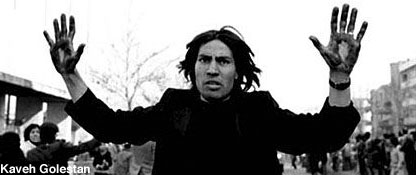
Spring of 79. I hadn’t yet turned twenty.
It was the day of the demonstration against the banning of the last liberal newspaper, Ayandegan, only a few months after the revolution.
Before we left home, Arash – my cousin and Kian’s brother – promised my parents he would protect me by swearing on the Koran to impress them, even though my parents never cared about religion, even though they knew Arash was a converted Communist.
It was a warm day.
“Wear comfortable shoes and don’t carry anything heavy,” Arash said.
Once we joined the line of protesters, Arash grabbed my hand and didn’t let it go. We walked and sang revolutionary songs. As soon as we reached the closed gate of Tehran University, Pasdars blocked our way, and the crowd stopped moving. We sat on the ground. Shoulder to shoulder. Legs over legs. Hands on hands. My foot touched strangers’ backs, and strangers’ breath plugged my lungs. My voice got lost in theirs, and the heat of their bodies consolidated in mine. The sun hid behind a white cloud, and the ground felt harsh, but warm. As we were singing slogans against one or in favor of another, a green truck approached, and an old woman, in black chador, descended from the driver’s seat. She talked with the Pasdars before climbing up the back of her camion.
It was the last blissful minute of my life.
A few Pasdars followed the old woman. Seconds later, the rocks started to fall like an imprecating deluge, and anonymous men with beards emerged among us, carrying chains and knives. They attacked whoever had the misfortune of being near. The crowd, swept up by uncertainty, lost its keenness and panic imposed its silence and burst wide open.
“Run,” Arash screamed. “Run,” he repeated. He pulled my arm, but I couldn’t move, fascinated by the chaos, by the color of the fresh blood running down the face of the man who moments before could smile or sing, by the view of the ripped flesh and the sound of breaking bones. Everyone pushed me, and the sum of their fear carried me toward the sky. The women in black chador bossed around the men in beards, urging them to randomly throw stones. My feet lost contact with the ground, and I moved higher and higher, almost as if I had become an angel, flying. Arash begged me to lower my head, but I had lost control over my body. I ignored the pain penetrating my shoulders, piercing my hands. I acted as if I were sleepwalking, enchanted by my own hoist to heaven, bewitched by the apparition of hatred, ravaged by the revelation of my own antagonism.
This was how I missed the main point: Being salvaged.
Arash grabbed my waist and dragged me over the bodies, feeling no guilt. We ran in the streets and met people we didn’t know. We crossed a young reporter’s path; he was desperate to hide his equipment.
“I taped everything,” he said.
We tried to hide the camera in my purse, but it didn’t fit.
“Throw it away,” Arash suggested.
“How could I?” he asked, hopelessly smiling. “It holds our history.”
I will never forget his bleak eyes and the way he held his camera. Did the choice I had made on that day– by taking that particular purse instead of another, bigger one—have any impact on my life? Should I wonder still about all the possibilities, about not being a savior?
In those frightening times I ran with my small purse, empty of remorse, searching for a place where I could bury myself. And that young man did the same. I guess we both succeeded in different ways.
Arash drove me to the second floor of a packed printing shop, which faced the university. We sneaked through the shutters, and I let go of Arash’s sweaty hand, startled by the image of an old woman standing on top of a pile of stones, throwing sharp rocks at the still body of a man with his bloody, broken camera – holding our history — in hand. But did I feel any sadness or regret? I couldn’t tell.
When we finally got home, Kian was waiting, worried sick, like Father, like Mother, and yet, he looked like a stranger. Arash swore he would take me to no more demonstrations, and Mother grounded me for the rest of my life, and Father lost all his hope for my future and threatened to hide me in my room as long as Khomeini was alive.
I didn’t mind. Way before the revolution started, I was already hiding in my room.
Kian, who was like a brother to me, who later turned Islamist, who hadn’t joined the parade and hadn’t shared our fear, remained quiet, expressing something that I later understood to be his animosity towards my utopian idea of individualism. He had decided that through his silence, he would tell me how wrong I was, and how much that young reporter had deserved to die.






